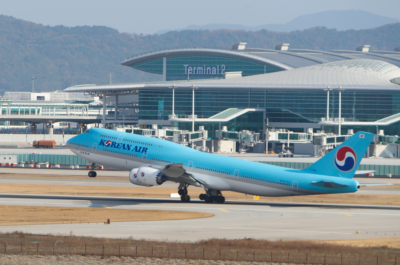The number of smartphones carried by airline passengers has doubled over the last year making them an important tool for travelers wishing to check-in remotely, access flight information on the go, or use an emerging range of flight-related applications, according to the 2011 SITA – Air Transport World Passenger Self-Service Survey published yesterday…

The number of smartphones carried by airline passengers has doubled over the last year making them an important tool for travelers wishing to check-in remotely, access flight information on the go, or use an emerging range of flight-related applications, according to the 2011 SITA – Air Transport World Passenger Self-Service Survey published yesterday.
Possession of a smartphone has jumped from 28% in last year’s survey to 54% this year; 74% of first/business class respondents and frequent flyers (10+ round trips per year) were carrying one. At the world’s busiest airport, Hartsfield-Jackson, Atlanta, 75% of survey respondents were carrying one.
Among respondents carrying a mobile device 73% would like to use mobile boarding passes while 17% had already used them at least once. High service availability at Frankfurt International Airport has generated the highest usage with 25% of respondents having used mobile boarding passes once or more.
The rising influence of the smartphone is a key finding from the sixth annual SITA – ATW Passenger Self-Service Survey carried out with a representative sample of the 283.5 million passengers who pass through six of the world’s leading airport hubs. For the first time, a major hub in the Middle East, Abu Dhabi International Airport, has been included alongside regular participants: Beijing International Airport; Frankfurt International Airport; Hartsfield-Jackson, Atlanta; Mumbai International; and Sao Paulo Guarulhos.
Francesco Violante, SITA CEO, said: “We are now entering the era of the mobile-centric passenger, who is not only able to manage his or her journey independently but also expects personal and timely communication from airlines, airports and other providers of travel-related services. Smartphone penetration is opening up new frontiers for passenger self-service across key steps of the passenger journey from check-in to boarding. Technology on mobile devices, such as Wi-Fi and Bluetooth connectivity, can be used to improve passenger flow, alleviating areas of passenger concern such as queues at border control and security.”
Overall, 23% of departing passengers stated that they had Bluetooth on at the airport. The lowest level of activation was at Frankfurt (11%) but even that is sufficient to monitor passenger flow, measure delays and take corrective action. Among frequent flyers and first/business class passengers activations levels were higher at 36% and 37% respectively.
Smartphone users are at the forefront of the adoption of mobile check-in. Some 31% of smartphone holders use mobile check-in frequently or occasionally, while 36% of interviewed first/business class passengers do so.
SMS flight information is also growing in popularity. Over 50% of first/business class travelers and frequent flyers receive SMS notifications; the 2011 SITA Airline IT Trends Survey suggests that the service is available to 76% of passengers, although it may not cover all flights.
Over 80% of respondents are not interested in receiving information on shopping deals over mobile devices but there are regional variations. Interest level is higher in Abu Dhabi (34%), Beijing (32%) and Mumbai (30%). Generally, those who fly less frequently and younger passengers are more interested.
Three out of four smartphone users would connect to a free airport Wi-Fi network, giving an opportunity to provide real-time information through mobile applications to passengers. They want access to trip-related information with 23% willing to pay for these services. The most popular are flight information, 77%; wait times at security, 50%; time to reach departure gate from current location, 40%; location of nearest lounge, 21%; and airport parking, 21%.
Mobile check-in, off-airport check-in and roaming agent check-in are growing in use and complementing the continued popularity of airport kiosks and web check-in. The relentless trend towards self-service check-in is well illustrated by Frankfurt where it has gone from 41% to 61% in the space of a year and in Mumbai, where it has almost doubled, from 36% in 2010 to 63% in 2011.
Overall, the number of passengers checking in at a counter continues to decrease and the survey concludes that the check-in counter is destined to become dedicated to non-standard check-in, staffed by agents trained to handle complexity.
However, over half of all checked-in bags are still dropped at a check-in counter and 20% of passengers state this as the main reason for not using self-service check-in. Lessons can be learned from Abu Dhabi International Airport where 13% of interviewed passengers used off-airport bag check-in.
The survey found that interest in new self-service options is high with passengers eager to adopt new offers such as self-boarding gates, bag drop-off belts and bag tracking applications.
Tatiana is the news co-ordinator for TravelDailyNews Media Network (traveldailynews.gr, traveldailynews.com and traveldailynews.asia). Her role includes to monitor the hundrends of news sources of TravelDailyNews Media Network and skim the most important according to our strategy. She holds a Bachelor degree in Communication & Mass Media from Panteion University of Political & Social Studies of Athens and she has been editor and editor-in-chief in various economic magazines and newspapers.














































![[PR] PR_Ascott and Vimut Hospital_2024](https://www.traveldailynews.asia/wp-content/uploads/2024/04/PR-PR_Ascott-and-Vimut-Hospital_2024-400x265.jpg)


















